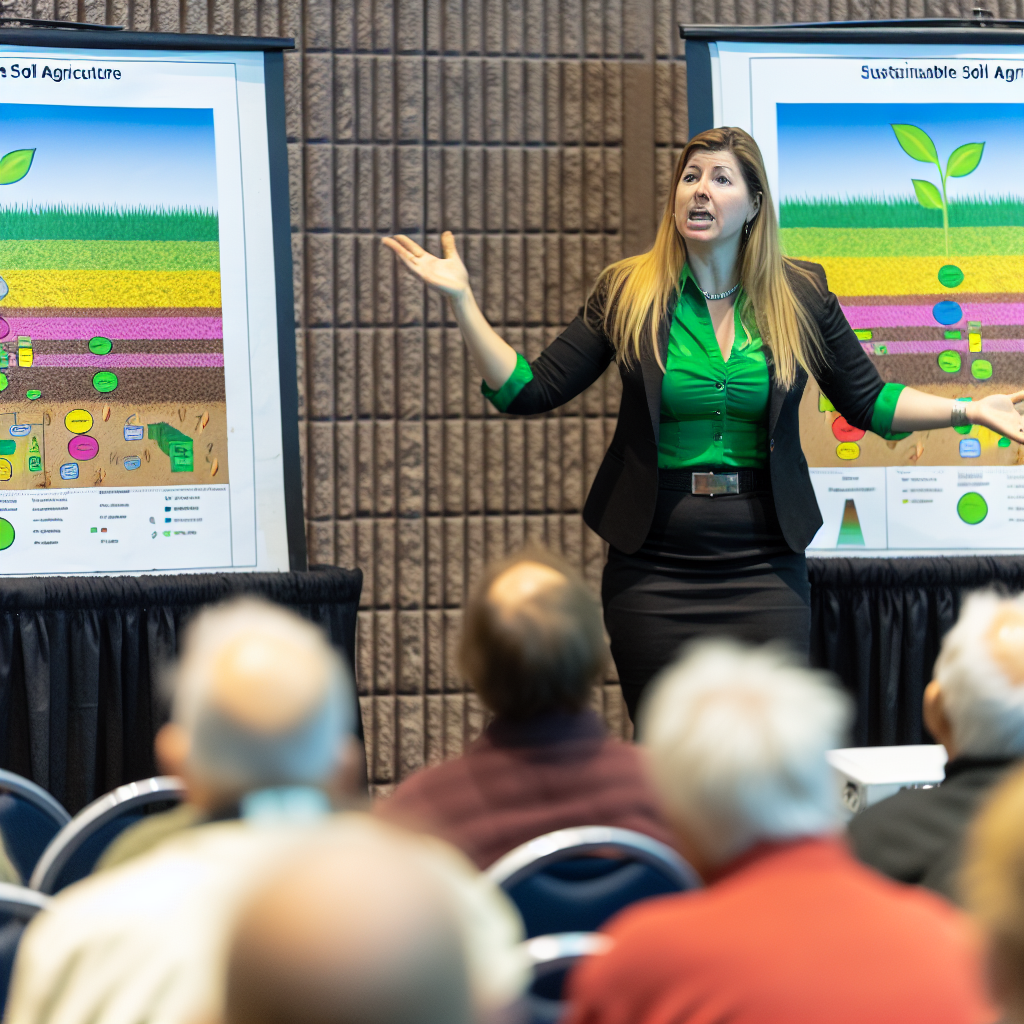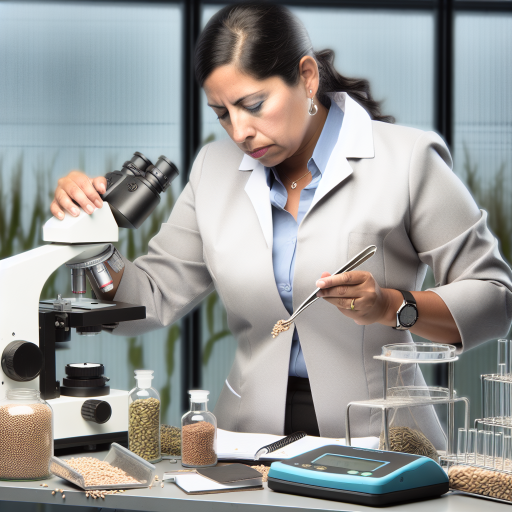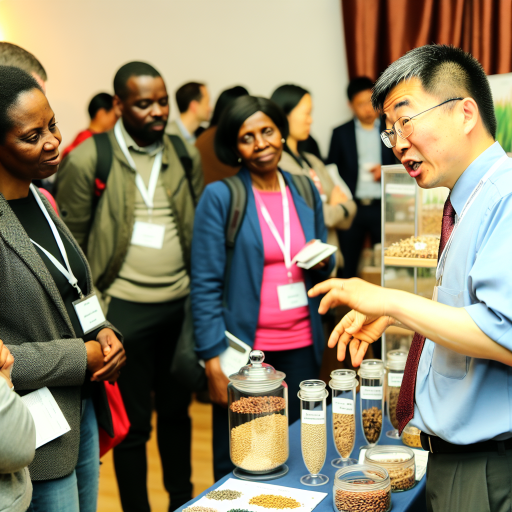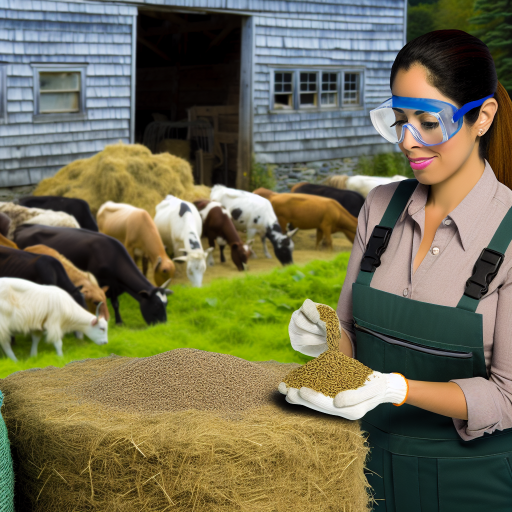Introduction to Soil Science and its Importance in Sustainable Agriculture
Soil science plays a critical role in sustainable agriculture.
This field studies soil properties, processes, and uses.
Healthy soil supports plant growth, enhances crop yields, and maintains ecosystem balance.
Furthermore, soil scientists analyze soil compositions to improve agricultural practices.
Understanding Soil Composition
Soil is a complex mixture of minerals, organic matter, air, and water.
This composition affects nutrient availability for plants.
Soil scientists assess these components to optimize farming techniques.
Moreover, they evaluate how soil interacts with agricultural inputs like fertilizers.
Benefits of Healthy Soil
Healthy soil promotes biodiversity, which is essential for thriving ecosystems.
It also improves water retention and reduces erosion.
Besides, productive soil can sequester carbon, helping to combat climate change.
Thus, investing in soil health leads to sustainable agriculture.
The Role of Soil Scientists
Soil scientists contribute valuable expertise to farmers and policymakers.
They conduct research to enhance soil management practices.
This research often leads to the development of sustainable farming guidelines.
Additionally, they provide targeted recommendations for soil amendments.
Collaboration with Farmers
Soil scientists often partner with farmers to identify local soil issues.
Their collaboration fosters the adoption of eco-friendly practices.
For instance, they promote cover cropping and reduced tillage techniques.
As a result, these practices increase soil health and productivity.
Education and Outreach
Soil scientists engage in educational outreach to raise soil awareness.
They organize workshops and seminars for agricultural communities.
Through these efforts, they help farmers understand soil management importance.
Consequently, this leads to more informed agricultural decisions.
Overview of Canada’s Agricultural Landscape and Soil Types
Canada’s Diverse Agricultural Landscape
Canada boasts a rich and varied agricultural landscape.
Unlock Your Career Potential
Visualize a clear path to success with our tailored Career Consulting service. Personalized insights in just 1-3 days.
Get StartedThis landscape is shaped by numerous climates and geological conditions.
Farmers produce a wide range of crops and livestock across the country.
For instance, wheat thrives on the Prairies while berries grow well in British Columbia.
Additionally, the dairy industry flourishes in Ontario and Quebec.
Overall, Canada is one of the world’s largest agricultural producers.
Consequently, sustainable agriculture is crucial for environmental health.
The Importance of Soil in Agriculture
Soil is a fundamental resource for agricultural success.
Healthy soil supports plant growth and food production.
It provides essential nutrients, water retention, and a stable structure.
Furthermore, soil acts as a habitat for diverse organisms.
These organisms contribute to nutrient cycling and organic matter decomposition.
Without healthy soil, agriculture faces significant challenges.
Types of Soil Found Across Canada
Canada’s soil types vary significantly from region to region.
For example, Chernozem dominates the Prairie provinces.
This fertile soil is ideal for growing crops like wheat and canola.
In contrast, Podzol soils are common in forested areas of Canada.
These soils often require additional amendments for successful agriculture.
Finally, the clay soils found in southern Ontario hold water well, benefiting crops.
Each soil type plays a unique role in agricultural practices.
Thus, understanding these variations is vital for sustainable farming.
Key Responsibilities of Soil Scientists in Agricultural Practices
Soil Health Assessment
Soil scientists evaluate soil health regularly.
They conduct tests to analyze soil composition.
This assessment helps identify nutrient deficiencies.
Regular evaluations support sustainable crop production.
Soil Management Strategies
Developing effective soil management strategies is essential.
Soil scientists implement practices to enhance soil fertility.
They recommend crop rotation and cover cropping.
These practices help restore soil nutrients and structure.
Sustainable Agriculture Practices
Soil scientists promote sustainable agricultural practices.
They advise on using organic fertilizers and soil amendments.
This reduces reliance on chemical inputs.
Moreover, it improves soil biodiversity and health.
Research and Innovation
Conducting research is a fundamental responsibility.
Soil scientists study new methods for soil conservation.
Their research informs farmers about best practices.
Innovations in soil science enhance agricultural sustainability.
Collaboration and Education
Soil scientists collaborate with agricultural stakeholders.
They work closely with farmers to provide training.
Educational workshops promote best soil management techniques.
Additionally, they share knowledge about soil ecology.
Policy Development and Advocacy
Soil scientists advocate for policies supporting sustainable agriculture.
They contribute expertise to environmental policy discussions.
Policies can enhance soil conservation efforts across Canada.
Active advocacy helps secure funding for soil research.
Find Out More: How AgriTech is Revolutionizing Farming Careers in Canada
The Role of Soil Scientists in Soil Conservation and Management
Understanding Soil Health
Soil scientists play a vital role in understanding soil health.
They study soil composition and its biological properties.
This knowledge helps farmers improve soil management practices.
Consequently, healthy soil boosts crop productivity and resilience.
Implementing Conservation Practices
Soil scientists actively promote conservation practices.
They recommend cover cropping to prevent soil erosion.
This practice enhances soil structure and fertility over time.
Furthermore, they encourage no-till farming methods.
No-till farming reduces soil disturbance and enhances microbial activity.
Research and Data Collection
Soil scientists conduct crucial research on soil ecosystems.
They collect data on soil health and degradation globally.
This research informs governments and policymakers alike.
In addition, it provides a foundation for sustainable agriculture practices.
Educating Farmers and Communities
Education is essential to soil scientists’ roles.
They provide workshops and training sessions for farmers.
Through these programs, farmers learn sustainable practices effectively.
Moreover, soil scientists engage with local communities for outreach.
This engagement fosters a deeper understanding of soil conservation.
Collaboration with Agricultural Stakeholders
Collaboration is a cornerstone of soil science.
Soil scientists work closely with agricultural organizations.
They help develop guidelines and standards for soil management.
Moreover, they contribute to governmental policies on agriculture.
This collaboration ensures a holistic approach to soil conservation efforts.
Explore Further: How Climate Change Is Transforming Careers in Canada’s Agricultural Sector
Impact of Soil Health on Crop Yield and Farming Sustainability
The Connection Between Soil Health and Crop Yield
Ssoil health directly influences crop yield.
Healthy soils promote robust plant growth.
They provide essential nutrients that crops need.
Additionally, well-structured soils improve water retention.
This efficiency helps crops thrive during dry periods.
Consequently, farmers observe higher yields from healthy soils.
Benefits of Healthy Soils for Farming Sustainability
Healthy soils support sustainable farming practices.
They enhance biodiversity by supporting various organisms.
This biological activity contributes to soil fertility.
Moreover, healthy soils reduce the need for chemical fertilizers.
Farmers benefit from lower input costs and environmental protection.
Soil Conservation Techniques
Implementing soil conservation techniques is crucial.
Cover cropping protects soil from erosion.
This practice enhances soil structure and nutrient cycling.
Crop rotation prevents nutrient depletion.
Each crop utilizes different nutrients, promoting soil health.
Technology and Soil Assessment
Modern technology aids in assessing soil health.
Soil testing helps determine nutrient levels and pH balance.
Farmers use data to make informed decisions.
This approach leads to targeted soil management practices.
As a result, productivity increases sustainably.
Community Engagement and Education
Engaging the community enhances soil health awareness.
Workshops and educational programs foster understanding.
Farmers learn best practices for soil management.
Collaboration leads to sharing innovative techniques.
Furthermore, community involvement promotes a culture of sustainability.
Explore Further: Why Sustainable Farming Is Key to Canada’s Economic Growth
Collaboration between Soil Scientists and Farmers for Sustainable Practices
Importance of Teamwork
Soyl scientists and farmers play crucial roles in sustainable agriculture.
Collaboration enhances soil health and crop productivity.
Working together leads to better strategies for soil management.
Moreover, this partnership encourages knowledge sharing.
Shared Goals and Interests
Both soil scientists and farmers aim for productive farmland.
They prioritize sustainable practices for long-term benefits.
Farmers seek to improve yield while minimizing environmental impact.
Soil scientists provide guidance on best practices and technologies.
Thus, they help farmers adapt to changing climate conditions.
Innovative Techniques
Soil scientists develop innovative techniques for soil conservation.
Cover cropping is one effective strategy they recommend.
It protects the soil from erosion and improves its quality.
Additionally, no-till farming reduces soil disturbance.
This method promotes healthier soil ecosystems.
Training and Support
Training programs enable farmers to implement sustainable practices.
Soil scientists often lead workshops and field demonstrations.
These initiatives provide hands-on experience for farmers.
Furthermore, online resources and webinars broaden access to information.
Monitoring and Feedback
Continuous monitoring is vital for assessing soil health.
Soil scientists help establish baseline conditions for farms.
This data enables farmers to track changes over time.
Feedback loops improve management decisions and practices.
Building Relationships
Trust and mutual respect are essential for successful collaboration.
Soil scientists must understand farmers’ experiences and challenges.
Likewise, farmers benefit from scientific expertise and insights.
Strong relationships lead to more effective results.
You Might Also Like: Canada’s Thriving Agriculture Careers You Need to Know

Innovative Research and Technologies in Soil Science
Advancements in Soil Health Monitoring
Soil scientists utilize advanced technologies to monitor soil health effectively.
They employ sensors that provide real-time data on soil moisture and nutrient levels.
This innovation allows farmers to make informed decisions quickly.
Thus, enhancing soil management practices becomes easier and more efficient.
Precision Agriculture Techniques
Precision agriculture continues to revolutionize farming methods across Canada.
Soil scientists help develop algorithms for data-driven farming approaches.
These techniques optimize crop yields while minimizing environmental impacts.
Farmers can now apply fertilizers and pesticides with pinpoint accuracy.
Sustainable Soil Amendments
Researchers are exploring new soil amendments to boost sustainability.
Organic matter such as compost enriches soil structure and fertility.
Natural amendments also promote beneficial microbial communities.
This innovation reduces dependence on synthetic fertilizers.
Soil Erosion Control Technologies
Soil erosion poses a significant threat to agricultural productivity.
Soil scientists develop technologies aimed at erosion prevention.
Cover crops, for instance, play a crucial role in soil stabilization.
Moreover, their use enhances biodiversity and habitat restoration.
Collaboration and Knowledge Sharing
Collaboration between scientists and farmers is essential for soil health innovation.
Through workshops and seminars, knowledge sharing occurs regularly.
Farmers gain valuable insights into the latest soil science research.
Such partnerships result in the adoption of best practices for sustainable agricultural growth.
Policy Development and Advocacy by Soil Scientists for Sustainable Agriculture
Defining the Role of Soil Scientists
Soil scientists play a crucial role in sustainable agriculture policy development.
They provide evidence-based insights and data to guide agricultural practices.
Moreover, they help identify soil health issues that could affect crop yields.
By assessing soil quality, they inform agricultural stakeholders about sustainable options.
Building Collaborative Relationships
Soil scientists collaborate with farmers, policymakers, and researchers.
They create partnerships to promote sustainable practices in agriculture.
These collaborations enhance knowledge sharing and resource management.
In turn, this supports the development of innovative agricultural policies.
Advocacy Initiatives
Soil scientists advocate for sustainable practices through various initiatives.
They participate in workshops to educate farmers about soil management.
Additionally, they engage in public forums to raise awareness about soil health.
They also contribute to reports that influence agricultural policies at multiple levels.
Contributing to Policy Formulation
Soil scientists contribute valuable research to inform policy development.
They analyze soil data to outline the implications of different agricultural practices.
Furthermore, they provide recommendations that align with environmental regulations.
Their work helps shape policies that promote conservation and sustainable land use.
Impact on Agricultural Sustainability
Their efforts have significant impacts on agricultural sustainability in Canada.
By promoting practices that protect soil health, they support long-term agricultural viability.
This ultimately benefits farmers, consumers, and the environment alike.
As advocates for sustainability, they help ensure food security for future generations.
Future Challenges and Opportunities for Soil Scientists in Canada
Climate Change Effects
Climate change significantly impacts soil health and productivity in Canada.
Soil scientists must adapt their research to address changing conditions.
They should focus on soil carbon sequestration to mitigate climate effects.
Understanding the interaction between soil and atmospheric changes is essential.
Technological Advancements
Emerging technologies provide exciting opportunities for soil science.
Precision agriculture tools improve soil management practices.
Soil scientists should leverage data analytics to enhance their research.
Examples include using satellite imagery and soil sensors effectively.
Education and Outreach
Soil scientists face the challenge of increasing public awareness about soil health.
Public education programs can help inform farmers and communities.
Collaboration with educators enhances outreach strategies.
Engaging with local communities builds support for sustainable practices.
Policy and Funding Support
Government policies shape the direction of soil research and agriculture.
Soil scientists should advocate for funding to support innovative research.
Partnerships with agricultural organizations can strengthen policy influence.
Ultimately, a proactive approach in policy is crucial for progress.
Research Collaboration
Collaboration among researchers fosters innovative solutions to soil challenges.
Interdisciplinary partnerships can enhance the impact of soil science.
Engaging with agricultural stakeholders brings real-world relevance to research.
Joint studies provide comprehensive insights into sustainable practices.
Long-term Sustainability Goals
Soil scientists must align their goals with national sustainability initiatives.
They should focus on long-term soil management strategies to boost productivity.
Ensuring soil health is integral to maintaining food security in Canada.
Working collaboratively with farmers fosters a shared commitment to sustainability.
Additional Resources
Agroecology in Canada: Towards an Integration of Agroecological …




